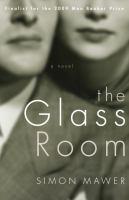
 This book is about a magic house towering above the Czech city of Brno. The house was custom built by a visionary architect for a Jewish-Catholic newlywed couple in the 1920s. The new house projects wealth, self-confidence, beauty and a new architectural form. The couple only gets to enjoy the house until the country is occupied by the Nazi army and the family has to leave everything behind and flee. Their lives as refugees continue from country to country. But the life of the villa does not end with the departure of its owners. New residents come one after another: The Germans are replaced by the Russians who are replaced by the socialist state which becomes the owner of this architectural jewel. The house, whose central feature is a glass room, takes on many personas throughout the times, moving from a home to a laboratory to a gymnasium to a museum and to horse stables. But the enchanting glass room, from which the book gets its title, magically captures everybody who enters it.
This book is about a magic house towering above the Czech city of Brno. The house was custom built by a visionary architect for a Jewish-Catholic newlywed couple in the 1920s. The new house projects wealth, self-confidence, beauty and a new architectural form. The couple only gets to enjoy the house until the country is occupied by the Nazi army and the family has to leave everything behind and flee. Their lives as refugees continue from country to country. But the life of the villa does not end with the departure of its owners. New residents come one after another: The Germans are replaced by the Russians who are replaced by the socialist state which becomes the owner of this architectural jewel. The house, whose central feature is a glass room, takes on many personas throughout the times, moving from a home to a laboratory to a gymnasium to a museum and to horse stables. But the enchanting glass room, from which the book gets its title, magically captures everybody who enters it.
Mawer’s writing is inspired by the true story of the villa Tugendhat in Brno. In the beginning of the book the author states that this book is a work of fiction; however, the city, house and historical events are all real. The characters in the book are all loosely based on the life story of the house’s original Jewish owners, whose lives are turned upside down by the arrival of German army and the occupation of Czechoslovakia. Most of all, this book captures in vivid colors the genius loci, or "spirit of the place," of this majestic house.
The story of the house and its owners mirrors that of the Czech political reality of the second half of the 20th century. The title of the book in the Czech language is Skleněný pokoj and comes from an onyx wall lit by the western sun. “Pokoj” in Czech means peace, which is nothing close to what this house and the Czech nation got to observe.
The story will capture the attention of its readers from the first sentence. It is a story of a house, a family and a nation. The Glass Room by Simon Mawer was nominated for Man Booker Prize in 2009.
